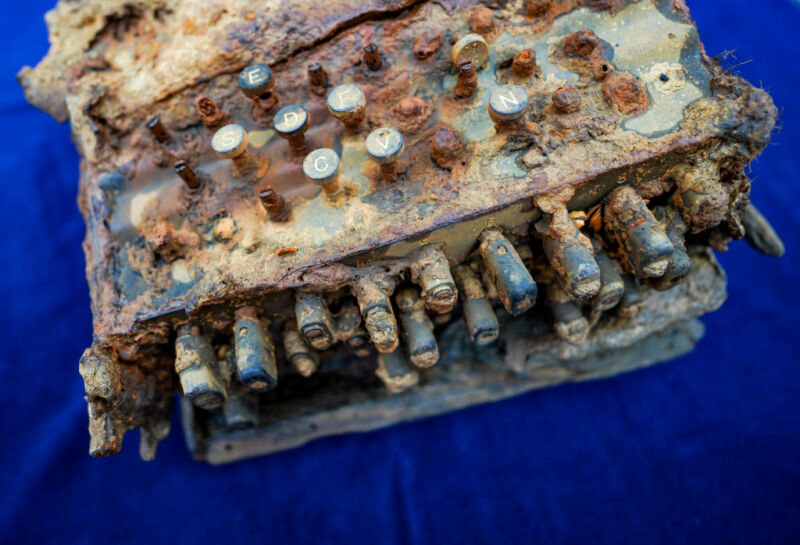Rusty but intact: Nazi Enigma cipher machine found in Baltic Sea

Divers scouring the Baltic Sea for discarded fishing nets have stumbled on the rarest of finds: an Enigma encryption machine used by the Nazis to encode secret messages during World War II.
The electromechanical device was used extensively by the Nazi military to encrypt communications, which typically were transmitted by radio in Morse Code. Three or more rotors on the device used a stream cipher to convert each letter of the alphabet to a different letter.
The Enigma had the appearance of a typewriter. An operator would use the keys to type plaintext, and the converted ciphertext would be reflected in 26 lights above the keys—one light for each converted letter. The converted letters would then be transcribed to derive the ciphertext.
Cipher keys were changed using a series of device settings that were changed regularly using lists that were made available in advance. People receiving the messages had to use the same lists as the senders for the messages to be readable.
Divers on assignment by the environmental group WWF found the Enigma machine last month while looking for abandoned fishing nets in the Bay of Gelting off the coast of Germany. As the image above shows, the recovered device was rusty and corroded, but individual keys showing the letters they designated remain intact and clearly visible.
“A colleague swam up and said, ‘There’s a net there with an old typewriter in it,’” Florian Huber, the lead diver, told the DPA news agency. The team soon realized the device was something much more remarkable.
“I’ve made many exciting and strange discoveries in the past 20 years. But I never dreamt that we would one day find one of the legendary Enigma machines,” Huber told Reuters.
The diver said he suspects the device was lost shortly before Germany’s surrender in May 1945. At the time, Nazi leaders issued an order for submarines to be scuttled in the Gelting Bay to prevent their capture by the Allied Forces.
The Enigma made it hard for the Allied Forces to track German submarines until a British team led by mathematician and scientist Alan Turing broke the encryption the device used. The feat, which built off of breakthroughs made by scientists from the Polish Cipher Bureau, made it possible for the Allies to decipher messages about German military movements. Many historians credit the accomplishment with shortening the war and preventing many thousands of deaths.
Experts from the State Archaeological Museum will restore the machine. The process, which will include a comprehensive desalinization, is expected to take about a year.
Post updated to add detail about Polish Cipher Bureau.
https://arstechnica.com/?p=1727730